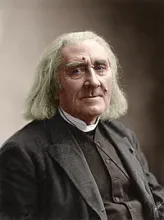Franz Liszt (German: [ˈlɪst]; Hungarian: Liszt Ferencz, in modern usage Liszt Ferenc [ˈlist ˈfɛrɛnt͡s];[n 1] 22 October 1811 – 31 July 1886) was a Hungarian composer, virtuoso pianist, conductor, music teacher, arranger, and organist of the Romantic era. He is widely regarded as one of the greatest pianists of all time. He was also a writer, philanthropist, Hungarian nationalist, and Franciscan tertiary.
Liszt gained renown in Europe during the early nineteenth century for his prodigious virtuosic skill as a pianist. He was a friend, musical promoter and benefactor to many composers of his time, including Frédéric Chopin, Charles-Valentin Alkan, Richard Wagner, Hector Berlioz, Robert Schumann, Clara Schumann, Camille Saint-Saëns, Edvard Grieg, Ole Bull, Joachim Raff, Mikhail Glinka, and Alexander Borodin.
A prolific composer, Liszt was one of the most prominent representatives of the New German School (German: Neudeutsche Schule). He left behind an extensive and diverse body of work that influenced his forward-looking contemporaries and anticipated 20th-century ideas and trends. Among Liszt's musical contributions were the symphonic poem, developing thematic transformation as part of his experiments in musical form, and radical innovations in harmony.
LISZT, Franz
フランツ・リスト
フランツ・リスト(ドイツ語: Franz Liszt)、もしくはリスト・フェレンツ(ハンガリー語: Liszt Ferenc、1811年10月22日 - 1886年7月31日)は、王政ハンガリー出身で、現在のドイツやオーストリアなどヨーロッパ各地で活動したピアニスト、作曲家。
自身の生誕地(後述)であり、当時属していたハンガリー王国(当時はオーストリア帝国支配下の版図内)を祖国と呼び、ハンガリー人としてのアイデンティティを抱いていたことから、死後も「ハンガリー」の音楽家として認識・記述されることが多い。その一方で生涯ハンガリー語を習得することはなく、両親の血統、母語、音楽家としての活動名義(フランツ・リスト)、最も長い活動地のいずれも「ドイツ」に属し、当時の中東欧に多数存在したドイツ植民の系統でもある。このような複雑な出自や、ハンガリー音楽を正確に把握していたとは言い難い作品歴から、非音楽大国系の民族運動としての国民楽派に含めることは殆どなく、多くはドイツロマン派の中に位置づけられる。
ピアニストとしては演奏活動のみならず、教育活動においてもピアニズムの発展に貢献をした。また、作曲家としては新ドイツ楽派の旗手、および交響詩の創始者として知られる。ハンス・フォン・ビューローをはじめとする多くの弟子を育成した。

2 件中の 1 - 2 件目を表示



